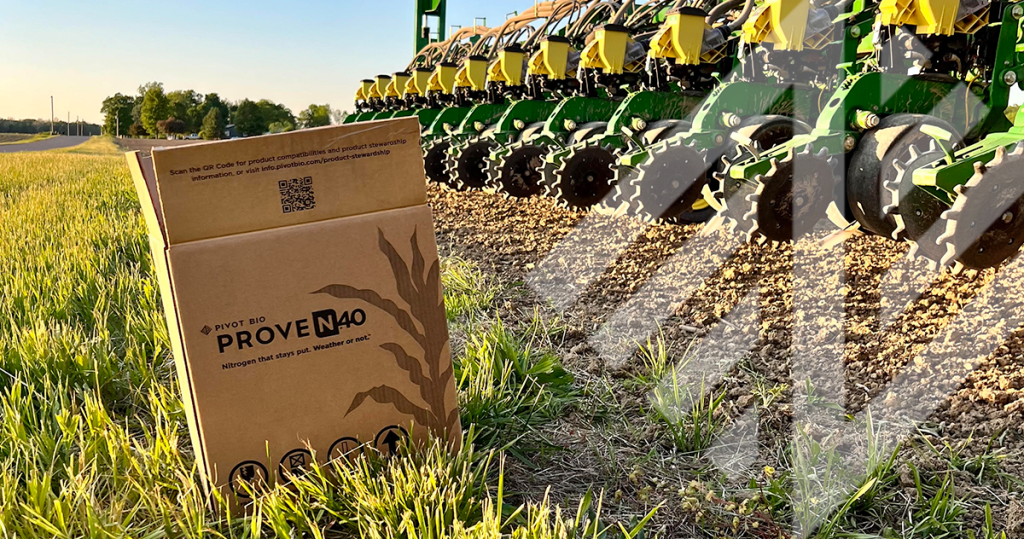Embracing Innovation: What Agronomists Need to Know About the Evolving Way to Evaluate Nitrogen and Why Structured Trials Are Essential to Reliable Data

With the tremendous pressure on the agricultural industry to feed the world’s growing population while protecting natural resources, growers need nitrogen that is reliable, predictable, and better for the environment without compromising yield.
Pivot Bio microbes are a breakthrough agricultural innovation that make farming more productive and are one of the industry’s most promising climate solutions. Our technology meets the demands for nitrogen consistency and dependability by enabling microbes to adhere and remain on the roots of the plant throughout the growing season.
The result is a nitrogen that is weatherproof and safer to handle. Our nitrogen does not leach and does not contribute to nitrous oxide pollution. It’s simple: The more synthetic nitrogen that is replaced with microbial nitrogen, the cleaner our water and air will be.
We have taken nitrogen science to a scale that has never been seen, and as a result, it is changing how nitrogen should be evaluated. Today’s approach only values yield improvements, which is as outdated as only testing cars for how fast they go, rather than their quality, safety, or how many miles per gallon they get.
That’s why Pivot Bio collaborates with multiple universities that conduct structured trials demonstrating how our breakthrough technology maintains or improves yield while delivering on our product promise to reduce dependence on synthetic nitrogen fertilizer and increase profitability, predictability, and sustainability.
While we continue to do agronomy outreach and education, we were disappointed to read the narrowly focused article recently published through North Dakota State University Extension titled, “Performance of Selected Commercially Available Asymbiotic N-fixing Products in the North Central Region.”
We were especially concerned that the article fails to include critical context about many trial locations that readers need to make informed interpretations of the data. Such misinformation or exclusion of needed context leaves readers with product performance misperceptions.
Examples of misinformation in the NDSU Extension article include:
1. Readers were not informed that many of the trials highlighted in this extension paper support what we have told farmers all along – they can replace some of their synthetic nitrogen with Pivot Bio PROVEN® 40 and maintain yield.
The NDSU article does not reveal that many plots treated with Pivot Bio microbial products applied with reduced nitrogen rates achieved yield parity with the full-rate synthetic nitrogen check. Also not revealed was the fact that corn yield in one state increased numerically in more than 80% of the quality checked plots treated with PROVEN or PROVEN 40 plus full rate nitrogen.
Pivot Bio’s microbial nitrogen is a reliable replacement for synthetic fertilizer. The view that improved yield is the only possible way to measure the efficacy of nitrogen fixing microbes, or synthetic nitrogen for that matter, is shortsighted.
Our product has demonstrated that it efficiently and reliably replaces up to 40 pounds per acre of synthetic nitrogen while maintaining yield. We have multiple, independent third-party studies that demonstrate the efficacy and environmental benefits of Pivot Bio’s products.
While other independent research clearly demonstrates yield improvement, yield is not the only way to measure the efficacy of nitrogen and is not the lead claim Pivot Bio makes in our product outreach to growers.
2. The team behind the NDSU Extension article did not align with our product protocol.
They requested to work with PROVEN 40 but wanted to apply it with 80 pounds of nitrogen per acre when we’ve been clear in our materials that while we have a vision to fully replace synthetic nitrogen, right now growers can confidently replace up to 40 pounds of nitrogen per acre. The NDSU protocol set our product and others up for failure by only pairing with and 80 LB/A N rate. Because NDSU refused to change protocol, we declined to participate.
3. More than 30% of the sites from one state that tested PROVEN and/or PROVEN 40 should be disregarded because Pivot Bio PROVEN or PROVEN 40 was mixed with products that have been shown to kill or severely harm the microbes.
Our microbes are living organisms and that means product stewardship is very important. Our product is not a chemical that growers can throw in a hot barn for six months and then use. Like any living thing, it takes care. We invest a great deal of effort in educating our customers on how to store, handle, and use our products. Pivot Bio has evaluated thousands of products and product mixtures for our customers to determine biological tank mix compatibility. We publish guidelines that are available directly from Pivot Bio or via our sales rep network. Guidance from Pivot Bio was not requested for many of the trials included in the NDSU report. The NDSU article leaves out critical context about where and how the product was tested. When using products that contain living organisms, it is essential to understand how products were sourced, stored, handled, mixed, and applied. Site and product information was not provided for many of the trial locations included in the article. This type of location information and context is essential to understanding both the effects of microbially derived and synthetic nitrogen. Not including this context is misleading.
4. Corn plants at some of the locations were highly responsive to Pivot Bio PROVEN or PROVEN 40 while other factors limited the ability to measure that responsiveness in yield.
Factors other than nitrogen that could limit yield, nitrogen uptake, or crop response to extra in-plant nitrogen were not discussed in the article. Nitrogen was made by Pivot Bio microbes and taken up by the plant, and factors other than nitrogen limited yield and/or the plant’s ability to effectively use the extra nitrogen. Focus should be placed on addressing these other factors that limited yield response to synthetic and biologically derived nitrogen.
Structured trials produce reliable data.
Our transformative technology is changing something that has been done the same way for over 100 years, which threatens an incredibly lucrative business for some corporations. As we’ve grown our customer base and proven the effectiveness of our products, many farmers are realizing that they can reduce some of their synthetic nitrogen with Pivot Bio microbes and potentially capture additional revenue from evolving nitrogen and carbon credit exchanges. Only structured trials produce reliable data, and our independent research proves that our products deliver a more predictable and profitable form of nitrogen without polluting rivers and groundwater or contributing to climate change. Examples of independent research and positive environmental impacts of Pivot Bio’s nitrogen fixing microbes include:
- Nitrate leaching can be reduced by an average of 10 kilos of nitrogen per hectare (~9 pounds per acre) with the use of PROVEN 40.
- When combined with a Pivot Bio proprietary carbon additive, corn treated with PROVEN 40 could increase its yield advantage by up to 11 bushels per acre.
- The use of PROVEN 40 led to higher yields and about $12.50 per acre in additional revenue.
- In 2022 alone, Pivot Bio helped customers replace over 32,000 tons of synthetic nitrogen fertilizer, avoiding approximately 226,400 metric tons of CO2e – equivalent to powering 44,000 U.S. homes for a year.
- The company’s microbial nitrogen is manufactured with an emissions footprint that is just 2% that of synthetic fertilizer and uses 1,000 times less water.
- Pivot Bio’s products are highly efficient in the field with little waste; whereas only 40-60% of synthetic fertilizer ever reaches the crop, and the rest can leach, volatilize, or runoff into the environment.
We understand that not all stakeholders yet appreciate the need to rethink how the industry evaluates nitrogen. But at the heart of the problem with the NDSU extension article is a misunderstanding of what Pivot Bio is striving to achieve and why more and more growers are replacing synthetic fertilizer with our technology that harnesses nature to help them grow the food the world needs with reliable productivity and sustainability.


